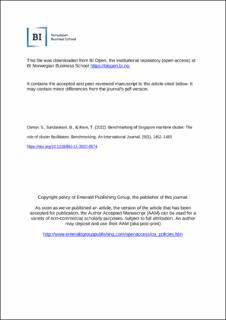| dc.description.abstract | Purpose This article analyses the role of cluster facilitators in the Singapore maritime cluster. Singapore has been recognised for its pro-business policies and its ability to attract international shipping companies to set up the ship ownership headquarters and ship management activities in Singapore. Design/methodology/approach The research is an empirical investigation on the approach for industrial cluster development of the Singapore maritime cluster, using the case study research methodology. The case study approach leverages on multiple sources of evidence from deep interviews (of 24 Singaporean firms and 13 Norwegian firms) related observations, documentation and archival records. As a means of contributing to the cluster renewal process, Singapore as the country embarks on the next stage of maritime cluster development, a benchmarking against the Norwegian Innovation Cluster has been incorporated. Findings The research findings reveals that Singapore is lacking in innovation activities that entails multi-firms collaborations and collaboration between multi-firms and research institutions. The existence of cluster organisation to facilitate collaborations between firms in the cluster and between firms in the cluster with research institutions is another contributing factor that are not institutionalised in the Singapore maritime cluster. Research limitations/implications Though the research is grounded primarily on the international business theory, particularly from firm- and country-specific advantages of location decisions, the economic geography theory and cluster theory also complement the theoretical grounding. Practical implications The findings derived from this research aim to facilitate policy makers, maritime leaders and practitioners to develop effective courses of action in current and future maritime industry development. Originality/value The research provides value to maritime industry stakeholders, maritime leaders and policy makers in their firm positioning strategy. Thus, the research adds values to the maritime industry with similar country perspectives and firm values for developing policies. | en_US |
